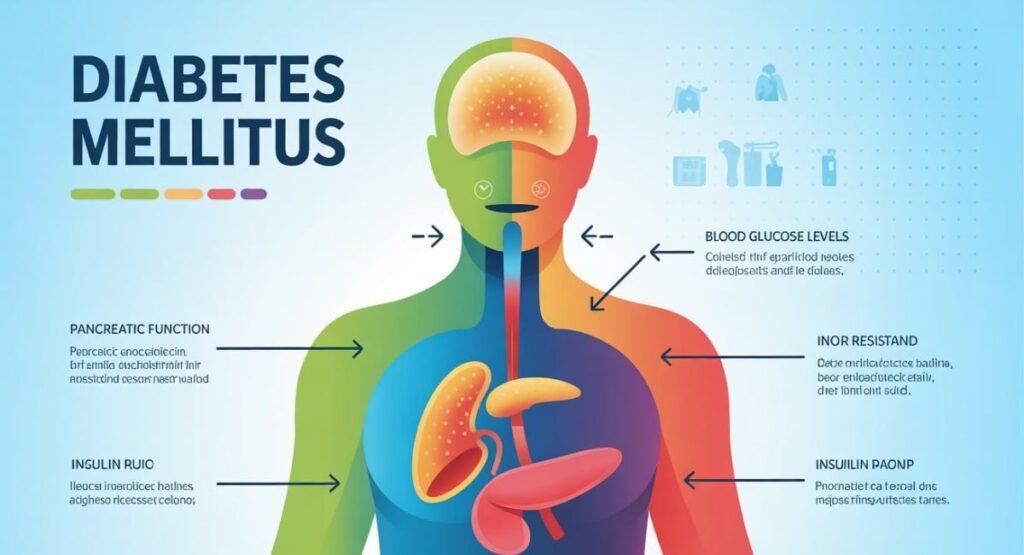Introduction
Diabetes mellitus is a chronic and complex disease that is spreading rapidly around the world. This disease is caused by a lack of insulin in the body or an obstacle to its effective use, as a result of which the amount of glucose (sugar) in the blood increases excessively. In the present era, this disease is having a profound impact not only on physical health but also on mental, economic, and social levels. This article will shed detailed light on the types, causes, symptoms, complications, preventive measures, and treatment of diabetes.

What is diabetes?
Diabetes is a metabolic disease in which the body either does not produce insulin or is unable to use it effectively. Insulin is a hormone that is released from the pancreas and works to transport glucose in the blood to the cells so that they can obtain energy. When there is a lack or malfunction of insulin, glucose starts accumulating in the blood, which gives rise to various complications over time.
Types of Diabetes:
- Type 1 Diabetes:
In this type, the body does not produce insulin at all. It is mostly found in children and adolescents and is also called insulin-dependent diabetes. Its patients have to take insulin injections daily.
- Type 2 Diabetes:
This is the most common type, especially in adults. In this, the body produces some insulin, but it does not work effectively. This disease is mostly caused by an unhealthy lifestyle, obesity, and hereditary factors.
- Gestational Diabetes:
Some women develop diabetes temporarily during pregnancy, which may go away after the baby is born, but sometimes it turns into permanent diabetes.
Causes of diabetes:
Hereditary factors (family history)
Obesity and physical inactivity
Unbalanced diet (fatty and sugary foods)
Mental stress and discomfort
Hormonal changes
Aging
Long-term use of certain medications
Symptoms of diabetes:
Frequent urination
Excessive thirst
Sudden weight loss
Frequent hunger
Blurred vision
Fatigue and weakness
Slow healing of wounds
Skin infections such as skin, gum, and urinary tract infections
Complications of Diabetes:
- Heart Disease: Diabetes can damage the arteries of the heart, causing a heart attack or high blood pressure.
- Kidney Failure: Diabetes can damage the blood vessels of the kidneys, increasing the risk of kidney failure.
- Eye Problems: Diabetes can affect the blood vessels of the eyes, leading to blindness.
- Nerve Damage: Numbness, tingling, or pain in the hands and feet are symptoms of nerve damage from diabetes.
- Delayed Wound Healing: Even minor wounds can take a long time to heal, which can lead to infection or organ damage.
Diagnosis of Diabetes:

The following tests are performed to diagnose diabetes:
Fasting Blood Sugar Test (FBS)
Random Blood Sugar Test (RBS)
HbA1c
Glucose Tolerance Test (GTT)
Treatment:
There is no complete cure for diabetes, but it can be kept under control:
Insulin for type 1 and tablets or insulin for type 2.
- Diet control:
A balanced diet that includes low fat, low sugar, and high fiber.
- Exercise:
Daily physical activity helps keep sugar under control.
- Peace of mind:
It is important to avoid stress, get enough sleep, and adopt a positive lifestyle.
- Continuous monitoring of blood sugar:
It is very important to check your sugar yourself and get checked by a doctor from time to time.
Home and indigenous remedies:
Although medical treatment should not be abandoned, a few natural things can help control diabetes:
Menthi grains (soaked overnight and drunk in the morning)
Bitter gourd juice
Jamun seed paste
Using cinnamon, ginger and turmeric
Precautions:
Get regular checkups.
Avoid obesity
Stay away from stress
Avoid smoking and alcohol
Make a balanced diet and exercise a regular habit

Diabetes and social aspects:
Diabetes is not only a physical disease but also affects the mental, social, and economic life of the individual. A diabetic patient has to take care of diet, medicine, and physical activity at all times, which can disrupt his daily routine. Apart from this, the cost of medicines, frequent tests, and doctor’s fees becomes a burden on a common man.
Diabetes and Islamic teachings:
Health protection is given great importance in Islam. The Holy Prophet (PBUH) made moderation, a simple diet, exercise (walking), cleanliness, and sleep a part of life, which can help in preventing diseases like diabetes.
Conclusion:
Diabetes is a serious disease that can prove fatal if not controlled in time. However, diabetes can be kept under control by following a regular lifestyle, balanced diet, physical activity, medication, and doctor’s instructions. Public awareness campaigns, better medical facilities by the government, and social support can prove to be important weapons against this disease.




Pingback: 10 Effects Of Fast Food On Health
Pingback: Negative Health Effects Of Oversleeping -
Pingback: Tea Benefits And Side Effects -
Pingback: 15 Surprising Benefits Of A Healthy Lifestyle: